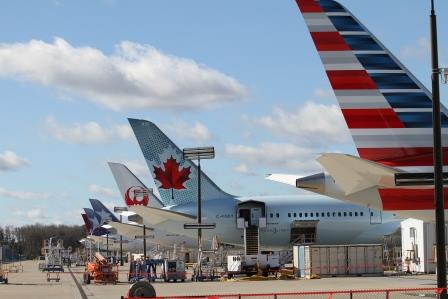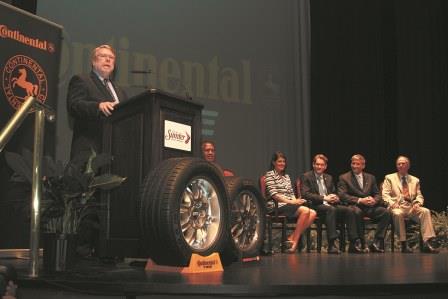Both the state and local governments have benefitted in recent years from the growth of the automotive and aerospace clusters in South Carolina. Looking ahead to the next few years, the SC Department of Commerce plans to not only build on that success but also cultivate its growing service industry sector, according to Commerce Secretary Bobby Hitt.
Since 2011, the state Department of Commerce has recruited investments from companies such as tire manufacturers Bridgestone, Continental and Giti; automakers and suppliers BMW, Mercedes Benz Vans, Volvo Cars and ZF Group; and aerospace company Boeing.

Boeing is among more than 100 aviation and aerospace related companies
that have operations in South Carolina. (Photo/Kim McManus)
South Carolina has recruited more than $23 billion in capital investments and 86,000 new jobs to the state during the past five years, according to the Commerce Department. Throughout Hitt’s tenure, the state has ranked number one in the export of both completed passenger motor vehicles and tires. In three of the last four years, South Carolina also has led the nation in jobs created from foreign direct investment per capita, according to the department’s website.
These major investments have brought with them additional, smaller investments. Volvo, for example, said it will rely largely on in-state suppliers for the parts that make up the body of the car. While some suppliers already have been identified in South Carolina and neighboring states, others are being recruited to set up shop here.
"I’ve often said that companies like Bridgestone and BMW function like big oak trees. As they thrive and expand, a lot of things can develop and grow in their drip line," Hitt said. "In 1994, the first South Carolina-made BMW rolled off of the assembly line at the global automaker’s Upstate facility. Today, there are more than 40 BMW suppliers operating in the Palmetto State. From both a local community and statewide perspective, the economic impact of these major manufacturing firms is remarkable."
Looking ahead, Hitt said, the mission of his department is to help the support industries that have sprouted around the state’s major manufacturers.
"These industry giants can’t do it alone, so we all need to work together to help each other out, ensuring prosperity for both the businesses and the people that reside in this great state," Hitt said.
Sumter is one city that has seen a huge investment from the state’s automotive cluster. Continental Tire has invested more than $500 million in expanding its Sumter facility, which will create about 1,600 jobs once it is at full production capacity. Continental is located in Sumter County off U.S. Highway 521, less than five miles from downtown Sumter.

SC Secretary of Commerce Bobby Hitt introduces Continental Tire executives
to a Sumter audience that filled the Sumter Opera House. (Photo/James T. Hammond)
"Since Continental’s announcement in Sumter, we have continued to see explosive growth, and we truly feel like the best is yet to come," said Howie Owens, downtown manager for the City of Sumter.
The historic downtown has seen $3.8 million in private small business investment, creating more than 130 new jobs, with a new 93-room Hyatt Place hotel scheduled to locate in the middle of downtown this summer. In addition, Sumter’s per capita income is at an all-time high—just $600 short of the state average of $36,077—and is trending rapidly toward higher levels, Owens said. Sumter County’s population also has grown from 106,000 to nearly 108,000.
"We are happy with the development that we have seen in recent years and are excited for what is to come," Owens said. "We have learned that collaboration breeds continued success."
To build on that success, local leaders in government and business have been working with educational institutions to develop a highly-skilled workforce able to meet the demands of advanced manufacturing, said Jay Schwedler, president and CEO of the Sumter Economic Development Board.
Central Carolina Technical College transformed an empty big box store into a 104,000 square foot state-of-the-art Advanced Manufacturing Technology Center, which is helping to train and educate a strong workforce for Continental Tire and other industries in Sumter and the surrounding areas.
Hitt said the priority is for the state to have a diverse economy on all fronts. While the automotive and aerospace industries have been and will remain a focus, the department also is building on its service industry sector.
Service-sector projects, including warehouse and distribution operations, totaled 44 percent of jobs recruited to the state last year, Hitt said. Projects by service-related firms Red Ventures, Movement Mortgage, Amazon, Dollar Tree and Moneypenny accounted for five of South Carolina’s top 10 economic development announcements of 2015, when ranked by number of jobs, Hitt said.
Hitt also noted that 70 percent of the world’s purchasing power is located outside of the United States.
"Moving forward, the continued recruitment of foreign investment will remain a top priority, so not only are we bringing jobs into South Carolina but also into the United States," he added.
South Carolina’s success is a team effort, Hitt said, and local leaders in communities across the state are the backbone of that team. Companies don’t locate in states or regions, he said. They locate in communities.
"When BMW executives first came to the Palmetto State to determine whether the area was suitable for investment, they were blown away by the hospitality and friendliness of everyday South Carolinians who had no idea who they were or what they represented," Hitt said. "It’s no secret that this state possesses a remarkable charm. And, truthfully, it’s our local governments and communities that are responsible for cultivating that tremendous appeal."
State and local leaders have worked hard to create a positive business environment to attract industry, he said. It helps to be a small state with good geography, infrastructure and a compact government scheme that can efficiently solve problems for companies, he said.
"Digging deeper, all of us in economic development know that education and workforce development are critical to industry recruitment and job creation," Hitt said. "Local school districts, community leaders, higher education and other state officials must continue to work together to ensure that South Carolinians in all corners of our state are properly prepared for the jobs of tomorrow."
